
Newsletter of the
INTERNATIONAL ENVIRONMENT FORUM
Volume 19, Number 11 --- 15 November 2017
Website: iefworld.org
Article submission: newsletter@iefworld.org Deadline next issue 13 December 2017
Secretariat Email: ief@iefworld.org General Secretary: Emily Firth
Postal address: 12B Chemin de Maisonneuve, CH-1219 Chatelaine, Geneva, Switzerland
Download the pdf version
From the Editor, Request for information for upcoming newsletters
This newsletter is an opportunity for IEF members to share their experiences, activities, and initiatives that are taking place at the community level on environment, climate change and sustainability. All members are welcome to contribute information about related activities, upcoming conferences, news from like-minded organizations, recommended websites, book reviews, etc. Please send information to newsletter@iefworld.org.
Please share the Leaves newsletter and IEF membership information with family, friends and associates, and encourage interested persons to consider becoming a member of the IEF.
European Center for Peace and Development
International Round Table, 27 October 2017
Global ECPD Youth Forum, 28 October 2017
Belgrade City Hall, Serbia
The European Center for Peace and Development, affiliated with the University for Peace established by the United Nations, has been working for over thirty years on reconciliation, religious tolerance and human security in Eastern Europe and most particularly the Western Balkans. Based in Belgrade, Serbia, with branches throughout the Western Balkans, it convenes meetings, encourages research, and offers advanced degrees on issues related to peace in the region. The International Environment Forum, through its president Arthur Dahl, has been supporting these efforts for the last decade.
On 27 October 2017, ECPD held an International Round Table in Belgrade City Hall on ”Peace and Democratic Multilateralism”, chaired by H.E. Prof. Dr. Federico Mayor, former Director-General of UNESCO, President of the Foundation for a Culture of Peace, and President of the ECPD Council. Other opening speakers were Dr. Ouided Bouchamaoui, Nobel Peace Prize 2015, and H.E. Prof. Dr. Erhard Busek, former Vice-Chancellor of Austria. Panels of distinguished speakers addressed “Global Institutions to Face Global Threats”, “Peace and Development: Integral, Endogenous, Sustainable and Human Development for a Dignified Life for All”, “UN Priorities in the New Era: Food, Water, Health, Environment and Education”, “The Agenda for Peace: The Declaration and the Programme of Action for a Culture of Peace”, concluding with “Concrete Proposals for Peace and Non-Violence at the Worldwide Level”. Arthur Dahl was a rapporteur for the round table, chaired one session, and presented a paper on “UN Charter Revision as the Foundation for Peace” based on joint work with Augusto Lopez-Claros and Maja Groff.
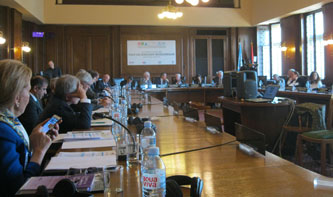 .
. 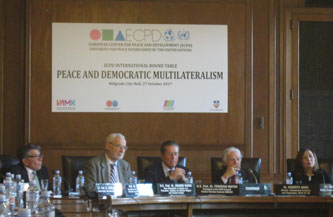
The wide-ranging presentations raised many important issues for peace. There were diagnoses of the problems, such as fragmentation, identity politics, xenophobia and populism, growing inequality, the failure treat migration properly in Europe, and the possibility that the third world war has already started. There were also proposals for solutions and ways forward.
The crises in the world show the importance of solidarity and dialogue as both an ideal and a requirement to address emergencies and to respond to globalisation with a new equilibrium. It is easier to declare war than to end a state of war, since there is little incentive to end warfare if you are not directly suffering from it, leading to a negative spiral with no answer.
It is essential to modify the United Nations to become a federal democracy, more participative, with new structures to replace national sovereignty and egoism. Alternatives like the G7-G20 are divisive and have not been effective. we must either act now, or wait to be forced to act. Radical changes are needed to make the UN an effective structure for action with a new paradigm for governance. The UN needs to adapt itself to fight terrorism, and to attack the roots of the problems that lead to terrorism, bridging the gap between the West and the Islamic world. The UN General Assembly should become a more representative legislative body, and means of enforcement should be strengthened and made mandatory, including an International Court of Justice with binding jurisdiction over all states. One proposal was for two new security councils for the environment and for social-economic issues. The Sustainable Development Goals are a point of departure and an opportunity to strengthen the framework for multilateral development.
With the progress in science and technology, a new civilization is not a utopia but a goal to be approached gradually. Research and education need to be emphasized. The focus should be on human beings and our global human purpose. A sense of global citizenship is stronger today in developing countries and among young people, and regressing in more industrialised countries. Our common sense of humanity needs to be strengthened to overcome an increasingly individualistic world. What we are lacking is visionary leadership.
The proceedings will be published by ECPD.
Global ECPD Youth Forum
The next day, ECPD organized a Global Youth Forum with over 50 participants from many countries, on ”Youth Peace-builders for a Sustainable Future”, for which Arthur was a co-chair and moderator. Federico Mayor, Ouided Bouchamaoui and Erhard Busek again gave opening keynotes on the importance of youth for peace. The text of the Nobel Peace Laureate’s speech is given below.
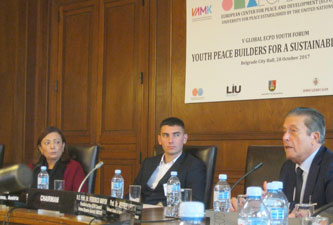 .
. 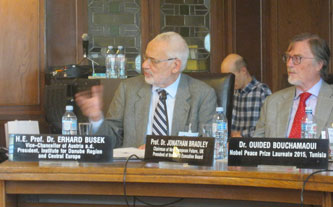
In the morning, presentations were given on “Peace and Education as Inseparable Aspects of Civilization”, and on “Unity in Diversity: Inclusion for a Sustainable Future”. One group called Youth United for Peace described their local efforts to heal the wounds caused by the fighting in the different cities of Bosnia and Herzegovina. Other youth were supporting the rapprochement process in divided Cyprus. Another group of youth organized a dialogue caravan through Serbia. There was a strong emphasis on vulnerable groups, exclusion, and the involvement of women. Dr. Farhang Tahzib described capacity building through the Youth Spiritual Empowerment Programme, with several participants present among the youth.
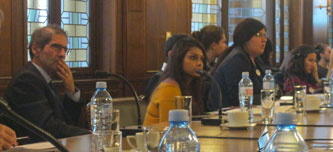 .
. 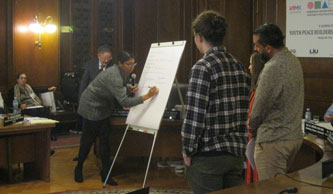
The afternoon was occupied with workshops on “Conflict Prevention and Interfaith Dialogue”, “Building Peace Online: How the Internet and Social Media can be Utilised for Advocacy and Peace”, and “Essential Skills for Today’s Sustainable Development Challenges”. There was an interesting report on research in Catalonia on youth use of the Internet for religion, with 65% of the youth considering themselves believers, and the creation of online communities but not yet much interreligious dialogue. Youth were drawing on the messages of Jesus, Luther, Abraham, Baha’u’llah and Muhammad in the search for trust, knowledge, a desire to help, good timing, and the power of persuasion.
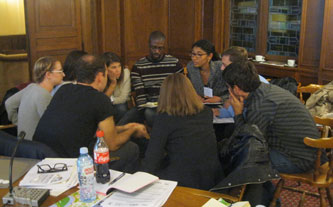 .
. 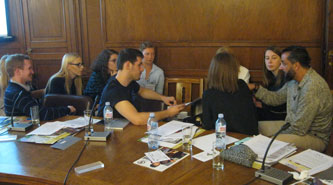
The participants in the Youth Forum went away stimulated, encouraged and motivated to work even harder for peace and sustainability.
Opening Speech
by Dr. Ouided Bouchamaoui
Nobel Peace Prize 2015, and President, Tunisian Confederation of Industry, Trade and Handicrafts (UTICA)
5th Global ECPD Youth Forum, Belgrade City Hall, 28 October 2017
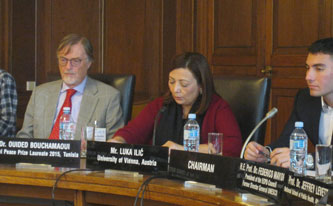
Never before in the history of mankind have the subjects of education and peace been so acutely and seriously felt. We are constantly reminded of their importance by the daily tragedies occurring in the four corners of the planet.
Tragedies caused by under-development, poverty, exclusion, unemployment, ignorance, social tensions, conflicts, wars and terrorism are all daily reminders of the prominence of the issues related to education and peace and of the extent to which they are intertwined.
In our daily struggle against all of those problems we can only brandish peace as a weapon. We do it by promoting education, sport, culture, and all values underlying “living together” such as tolerance, accepting others no matter how different they are in nationality, race, faith, or skin color.
We have to stand united against atrocity, ignorance, decadence, fear, intimidation, and all those who want to spread terror.
It is through propagating knowledge and upholding the universal values of coming together, tolerance and freedom, through investing in art and culture, and through providing equal chances and fair access to wealth that freedom-loving countries can forever consecrate peace as a daily practice and stand steadfast in the face of all types of extremists.
By being anchored in the values of tolerance and openness, The European Center for Peace and Development creates opportunities for people to come together internationally and engage in actions which consecrate these values.
Today, Mankind is facing a serious challenge: create a world with stronger bonds of solidarity. It must be a world full of justice and equality, where sharing and mutual respect are daily practices, and where the wellbeing of each individual comes from his or her contribution to the general prosperity.
Because of the violent transformations happening in our world, and because ignorance, intolerance, exclusion, and underdevelopment are feeding conflicts and violence, we have to more than ever respond with education for peace, human rights, democracy, tolerance and mutual understanding between cultures; in other words, we have to educate future citizens of this world about the principles of “living together”, about respecting each other and transcending all of our differences, be they in culture, religion, origin, or other. We need to create bonds of friendship beyond our frontiers; we need to be curious about other ways of life. History teaches us that whenever cultures came into contact with each other for peaceful exchanges of ideas and knowledge, the entire humanity progressed. It is then our duty to keep that flame burning.
Educating youth on how to become citizens must also be done in a global perspective. In other words, we need to find ways to prepare youth and allow them to take part in the decision process of issues crucial to the future of all peoples. In an increasingly interconnected world where the actions of each one of us can have far away consequences, there is no longer room for policies of isolationism, exclusion, and closure. Our destiny is to live together; so why not have future generations develop right now their understanding of the concept of “living together” and the competencies needed for that?
Our modest experience in the National Dialogue in Tunisia has taught us that whenever there is a will to do it, living together is possible. Thanks to dialogue, to listening to what the other has to say, and to a common desire to accept our differences, we were able with our social partners to extricate our country from its political crisis. It is obvious that experiencing intercultural learning as applied here can only strengthen the values of dialogue and openness.
I thank you once again for this opportunity to participate in this important Forum, which, given the quality of the participants, will be a new milestone in the promotion of Peace education for our Youth.
Spiritual Leaders Deliver Interfaith Climate Declaration at COP23
By Bicycle
Personal Commitment and Invitation to UN Climate Conference:
“Walk Gently on Earth”
Bonn, 10 November 2017. Scores of religious leaders and people of diverse faiths and spiritualities on bicycles, some wearing traditional religious clothing, delivered a multi-faith statement to the UN Conference on Climate Change (COP23), pledging to adopt sustainable behaviours themselves and calling on their followers and world leaders to do the same. The delivery also marked the launch of a new international, multi-faith sustainable lifestyles initiative.
Bishop Marc Andrus of the Episcopal Diocese of California was among faith leaders carrying the message to the UN meeting on bikes, symbolizing a commitment to sustainable transport. “By changing our own lifestyles, the lifestyles of our congregants, and the consumption habits of our congregations, we can help make good on our commitment to the Paris Agreement,” he says. “For us, it’s a way to state loudly and clearly: We’re still in.”
The COP23 Interfaith Climate Statement on Sustainable Lifestyle, entitled Walk Gently on Earth, represents a shared assertion by religious leaders globally that widespread sustainable behaviour change is required if global temperature rise is to meet the targets established by the Paris Climate Agreement.
“Together we are coming to you with an invitation to embark on a journey towards compassionate simplicity for the sake of the climate, the human family and the community of life,” the statement says. The signatories pledged to reduce home energy use, adopt plant-based diets, and use cleaner modes of transportation, behaviours which scientists say make the greatest contribution to household greenhouse gas emissions in many countries.
The statement marks the launch of a global Multi-Faith Sustainable Living Initiative, a campaign launched at a day-long symposium in Bonn November 9th. The livestreamed conference addressed the challenges and opportunities on how to best foster sustainable lifestyles. Partners in the Initiative include leading Protestant, Catholic, Evangelical, Jewish, Hindu, Muslim, Buddhist, Interfaith and Unitarian organizations.
Following events in Bonn, a community of multi-faith partners will work with spiritual leaders and people of faith worldwide to secure formal commitments to a sustainable lifestyle. “These commitments will accelerate a growing multi-faith sustainable living movement,” says Imam Saffet Catovic, Senior Advisor for GreenFaith, the organization coordinating the initiative. “The commitments will be announced at a global weekend of commitment in 2018 through thousands of grassroots events at spiritual and religious centers around the world,” he says.
Groups partnering on the Multi-Faith Sustainable Living Initiative include the Brahma Kumaris World Spiritual University, The Bhumi Project, CIDSE, Franciscan Action Network, the Global Catholic Climate Movement, the Global Muslim Climate Network, GreenFaith, Hazon, Islamic Society of North America, One Earth Sangha, Parliament of the World’s Religions, Friends World Committee for Consultation (Quaker), Unitarian Universalist Service Committee, the World Evangelical Alliance, and the World Council of Churches.
COP32 Inter-Faith Climate Statement
“Walk on Earth Gently”
A Multi-Faith invitation to Sustainable Lifestyles
November 2017
To all members of the human family and to leaders gathered at COP23:
We extend our warm greetings. We represent the world’s family of spiritualities, faiths and religions who share a profound gratitude for our precious planet.
Earth is a blessing. She supports life and is the basis of all our economies. She conveys beauty and evokes our recognition of something greater than ourselves. She is our temple, our mosque, our sanctuary, our cathedral. Our home.
Our actions now threaten the delicate balance of life on Earth, with climate change posing a most grave danger. Record numbers of severe storms, droughts, fires, and related catastrophes leave trauma and grief in their wake. Recent months have witnessed the tragedy of such occurrences in the Caribbean, the US, and India. We shudder over the enormity of this suffering and over what more lies ahead.
For thousands of years, our traditions have taught us to care for Earth. This responsibility has become urgent in recent decades. Our misuse of Earth’s generosity, while improving conditions for many, is not improving them for all and is fraying the web of life. The most vulnerable among us, those least responsible for this global threat, suffer the impacts of a warming climate unfairly and unjustly.
We have begun to respond, raising consciousness and starting to consume more sustainably. We have implored leaders to act. We have studied, prayed and petitioned, advocated, marched and mobilized. We have awakened to the urgent challenge and begun to change our ways.
However, we are at a crossroads. The Paris Agreement affirmed limiting temperature rise to well below 2°C, while pursuing efforts to a far safer 1.5°C limit. Our friends from Fiji and small island states, understanding the stakes and underscoring the science, have told us “1.5 to stay alive.” Yet we are currently headed for warming of 3°C or more, perilously beyond this limit.
This challenge is both dire and urgent. It calls for us to act.
As religious and spiritual leaders, we are committing to make changes in our own lives, and to support the members of our communities in doing the same. Together, we come to you with an invitation to embark on a journey towards compassionate simplicity for the sake of the climate, the human family, and the community of life.
For many of us, changes in three areas make the greatest impact: dramatically reducing emissions from our home energy use, adopting a plant-based diet and reducing food waste, and minimizing automobile and air travel. Because of the gravity of our situation, substantial and long-term changes in these areas are indispensable if we are to reach a 1.5°C future, particularly for those of us in communities whose carbon footprints exceed sustainable levels. We pledge our commitment to such change.
Through this collective effort, we look forward to creating a global community of conscience and practice in which we learn to put belief into action in relation to our own lifestyles. Our spiritual and faith communities will give us hope and companions for this journey. We will share ideas, materials, and stories of struggle and success. Our practices of mindfulness, spiritual discipline and prayer will enable us to grow. These ancient teachings and practices, and our renewed commitments and willingness to strive, will help us build pathways towards a sustainable future.
We wish to be clear that we understand that systemic change is required to solve this crisis. We will continue to advocate for the policies that are so urgently needed. However, we also believe that individual commitments and behaviors are as important in addressing climate change as they are in addressing poverty, racism, and other grave social ills. And we know that our spiritualities and traditions offer wisdom about finding happiness in a purposeful life, family and friendships, not in an overabundance of things. The world needs such wisdom; it is our privilege both to share and to seek to embody it.
We invite you to join the many others willing to walk this path by adding your name to this document, and by preparing to make commitments in the three areas named above. The diverse groups coming together in this moment will reach out to invite you to become involved in a programme of support and action which will take shape over the coming year. Let us pray and hope we can come together in love for each other, those who suffer from climate change, future generations, and planet Earth.
Let us commit to walk gently on Earth.
Quotes from religious and spiritual leaders on COP23 Interfaith Climate Statement
Addressing climate change by reducing our carbon footprint is a moral responsibility as Khualfa al-ard – caretakers, stewards, and guardians of the earth. We must care for all of creation. Reshaping our patterns of consumption and conservation not only help preserve the planet for us and our future generations, but also improve overall public health and economic prosperity, particularly for the vulnerable amongst us who are most severely impacted by climate change. Dr. Azhar Azeez, President, Islamic Society of North America
As Muslims we are enjoined to be the custodians of God on this earth. We must walk softly thereupon and do no harm. This ethic is desperately needed if we are to help avert a looming climate disaster. -- Imam Zaid Shakir, Co-founder, Zaytuna College, Berkeley, CA
God the creator has given us this world as our common home, together with all that are created and living here. We have to walk on the land and sail at the sea with care and deep respect for what is given. To love God and to love our neighbor means that we also love the creation of God. -- Rev Dr. Olav Fykse-Tveit, General Secretary of World Council of Churches
Keeping global warming below 1.5 degrees Celsius will take people of all faiths and all nations working together as quickly as possible. In Laudato Si' Pope Francis said, "All of us can cooperate as instruments of God for the care of creation. " That is why Catholics, through the Global Catholic Climate Movement, have signed this interfaith statement committing to adopting a sustainable lifestyle. We stand with our brothers and sisters of all faiths to protect creation the poor and vulnerable. -- Bishop Allwyn D'Silva Auxiliary Bishop of Archdiocese of Bombay
Climate change isn't a side issue for Catholics. It’s one of the most important things we can do to live out our faith. It's a way to protect the poor and care for the gifts God has given us. With sisters and brothers from all faith backgrounds standing beside us, we have good cause for hope. Climate solutions are within our grasp. -- Tomas Insua, Executive Director, Global Catholic Climate Movement
Evangelicals responding to the biblical call to care for creation want to know how they can live joyful, faith-consistent lives that care for God’s gift of creation. In addition to advocating for necessary large scale solutions to tackle climate change— which is the greatest creation care challenge of our generation, our individual lifestyle choices, when scaled up can make a big difference. -- Dr. Chris Elisara, Director World Evangelical Creation Care Task Force.
In the Hindu tradition we believe the world is one family. That world includes not only human beings but also all living beings, all of Mother Nature and Mother Earth. Therefore, it is incumbent upon each of us to live in a way that is sustainable for all beings with whom we share this planet, today and for all future generations. To abuse it, neglect it, or destroy it, is sacrilege. -- Sadhvi Bhagawati Saraswati, President Parmarth Niketan, Rishikesh, Global Interfaith WASH Alliance
We cannot be bystanders when our planet is in such danger; we belong to this living web and are called to consciously engage. While that engagement needs to address the larger political and economic systems that can wreak such havoc, it also needs to include our daily relationships with each other and the earth. Can our daily choices in consuming and sharing our own resources reflect the truth that we are a part of this precious world and it needs our care? -- Tara Brach, Buddhist author, teacher and founder of the Insight Meditation Community of Washington, DC
Assistance with Farsi
The Baha'i Institute of Higher Education has advised the International Environment Forum that the IEF web site is an important teaching resource for its courses for students in Iran who have no other access to higher education. It has asked us to translate some of the resources on our web site into Farsi to make them more widely available to their students. The present administrators of the web site have no competence in Farsi, so we are looking for volunteers who would take on the responsibility of translating and maintaining a Farsi section of the web site. Ideally a small group could share the responsibility. If you would like to volunteer for this valuable service, or know of someone who might be able to help, please contact us at info@iefworld.org.
Webinar by Paul Hanley on “Eleven”
The Wilmette Institute has recorded a video webinar by IEF member Paul Hanley on his book “Eleven”. As the book cover puts it: “Eleven billion people will share this planet by century’s end. Adding 4 billion to an already overburdened world will force everyone to change everything.” See IEF review of the book at https://iefworld.org/node/854. Paul is teaching a course on “Eleven” at the Wilmette Institute. The webinar can be viewed on YouTube at https://www.youtube.com/watch?v=usLjDFdf-Xg&feature=youtu.be
In Search of a Better World (book review)
by Arthur Lyon Dahl
One of the most unsustainable aspects of the modern world is the continuing presence of massive violations of human rights, which our technological sophistication only make more visible, numbing our human sensibility. In "In Search of a Better World: A Human RIghts Odyssey" (Canada: House of Anansi Press, 2017), based on the 2017 Massey Lectures, Payam Akhavan has written a most remarkable and moving autobiography, which immediately reached number one for non-fiction on the Canadian best-seller list upon its publication in September. You cannot help but be profoundly touched on reading it.
The author, himself a religious refugee as a child from the persecution of the Baha'is in Iran, went on to become a distinguished human rights lawyer, UN investigator of genocide in Bosnia, Cambodia, Guatemala, Rwanda and Timor-Leste, UN Prosecutor at The Hague, a member of the International Court of Arbitration, and now Professor of International Law at McGill University in Montreal, Canada. He has met both the victims and perpetrators of genocide, and delves deeply into the causes and effects of mass hatred and violence from the perspective of one who has been there and seen it. This is a deeply human book, sharing moments of compassion and revulsion, of tenderness and understanding, while acknowledging that the depths of human suffering can never be fully shared, and admiring the strength of the human spirit to rise above even the most unimaginable horrors.
He begins with the knowledge of suffering, both his own and that of his family and fellow Baha'is in Iran. This started him on a pursuit of global justice, leading to a doctorate from Harvard Law School. He traces the evolution of international law holding leaders individually accountable for their acts, from the Nuremberg trials after World War II, to the creation of the ad hoc International Criminal Tribunal for the former Yugoslavia where he was one of the first UN prosecutors, and a similar tribunal for Rwanda, leading to the establishment of the International Criminal Court. His work took him into the field, to Sarajevo in the midst of its murderous siege and to the opposing Bosnian Serb Republic, to the Rwanda of a massacred million, to visit mass graves and interview victims, leading finally to justice as a redemption for our shared humanity.
A major theme is the selectiveness of our will to intervene, taking action when it is in some geopolitical or economic interest, or leaving millions to a violent fate when no one outside seems to care, until it is too late. I was myself on a UN committee with the role to anticipate humanitarian crises and to pre-position aid for a humanitarian response. We failed to anticipate the scale of the Rwandan genocide and the role of extremist radio to incite mass murder. Akhavan dissects how that whole process unfolded, with the UN simply withdrawing since the big powers did not want to get involved. His analysis is important, as it shows the importance of early intervention to prevent the spread of hatred and violence before genocide can get under way.
He is understandably critical of academia and the ivory tower that dissects human suffering and calamity from a distance, and well as the halls of diplomacy at the United Nations, with high words and hand-wringing followed by cowardice and inaction. He shows again and again how cynical politicians in pursuit of national interests are always ready to sacrifice the poor for power and profit. The book exposes the revolting underbelly of Western "civilization" and the superficiality of materialistic consumer society where unimaginable horrors elsewhere appear briefly in the media and then vanish, until finally they spill over into terrorism at home.
In one chapter, he shows how geopolitical rivalry leading to the war in Afghanistan planted the seeds of terrorist movements that eventually reached out to Western capitals and the destruction of the twin towers in New York, where his family narrowly escaped death. More recently, Syria has been a tragic victim of the same self-interest and paralysis. He explores rape as an instrument of war, the exploitation of child soldiers, and other modern human rights abuses, where evil has been cultivated for selfish benefit. This contrasts with the emerging spirit of human rights and the positive signs of a growing awareness of the oneness of humankind and our higher human purpose.
Despite the repeated stories of abuse, violence and horror, this is ultimately a hopeful book, showing the power of the human spirit to overcome the unimaginable, how suffering can lead to a blossoming of higher human qualities. Akhavan's story itself is one of a dogged search for truth and justice, and the small steps that can gradually lead to the necessary changes in society to respond to the depths of depravity in which we still too often find ourselves. Those of us who have not seen such evil at close range can take this book as a lesson that we too must act to make the world a better place.
WRI Launches Interactive Platform to Support Action on Climate, SDGs
31 October 2017: The World Resources Institute (WRI) has launched Climate Watch (https://climatewatchdata.org/), an interactive platform providing data and visualizations on countries’ efforts towards achieving their Nationally Determined Contributions (NDCs) and the Sustainable Development Goals (SDGs).
The platform covers a variety of data, including current and historic greenhouse gas (GHG) emissions, future emissions scenarios, the SDGs and country progress on meeting climate pledges, as well as information on climate risk and vulnerability. Climate Watch includes: data and visualizations on all countries’ GHG emissions; a database of all countries’ NDCs; mapping of linkages between NDCs and the 2030 Agenda for Sustainable Development, including the SDGs and associated targets; data and visuals of major emitting countries’ emissions scenario pathways; national and sectoral profile pages on climate progress, risks and vulnerabilities; and downloadable data that can be customized and shared through My Climate Watch.
According to WRI research, climate commitments listed in countries’ NDCs are in line with 154 of the 169 targets of the 2030 Agenda for Sustainable Development. The greatest alignment is found in the sectors of energy, forest, land use and agriculture, but opportunities exist across all 17 SDGs, including health, transport and education.
The Climate Watch emission scenarios tool can help help policymakers and researchers determine the most economically advantageous ways to deliver their climate plans and collectively meet the goals of the Paris Agreement on climate change.
UN Designs SDG Boardgame for Children
30 October 2017: The UN Regional Information Centre (UNRIC) developed a board game called ‘Go-Goals!’ (http://go-goals.org/) to teach children about the SDGs. It is available through a free download that allows the user to print the instructions, question cards, and game board and pieces.
Intended primarily for children aged 8-10, the game aims to help children understand the Goals, how they impact their lives and how they can help achieve them.
The game is available in English, French, German and Spanish, with additional versions being produced in Chinese, Dutch and Italian.
The Lancet Commission on pollution and health
If you want the latest authoritative assessment of the state of pollution on the planet and its impacts on human health, and what we need to do about it, the new report from the leading medical journal The Lancet Commission on Pollution and Health is the source to use. Some excerpts from the executive summary follow.
Pollution is the largest environmental cause of disease and premature death in the world today. Diseases caused by pollution were responsible for an estimated 9 million premature deaths in 2015—16% of all deaths worldwide—three times more deaths than from AIDS, tuberculosis, and malaria combined and 15 times more than from all wars and other forms of violence. In the most severely affected countries, pollution-related disease is responsible for more than one death in four.
Pollution disproportionately kills the poor and the vulnerable. Nearly 92% of pollution-related deaths occur in low-income and middle-income countries and, in countries at every income level, disease caused by pollution is most prevalent among minorities and the marginalised. Children are at high risk of pollution-related disease and even extremely low-dose exposures to pollutants during windows of vulnerability in utero and in early infancy can result in disease, disability, and death in childhood and across their lifespan.
Welfare losses due to pollution are estimated to amount to US$4·6 trillion per year: 6·2% of global economic output. The costs attributed to pollution-related disease will probably increase as additional associations between pollution and disease are identified.
Pollution endangers planetary health, destroys ecosystems, and is intimately linked to global climate change. Fuel combustion—fossil fuel combustion in high-income and middle-income countries and burning of biomass in low-income countries—accounts for 85% of airborne particulate pollution and for almost all pollution by oxides of sulphur and nitrogen. Fuel combustion is also a major source of the greenhouse gases and short-lived climate pollutants that drive climate change.
Chemical pollution is a great and growing global problem. The effects of chemical pollution on human health are poorly defined and its contribution to the global burden of disease is almost certainly underestimated. More than 140 000 new chemicals and pesticides have been synthesised since 1950. Of these materials, the 5000 that are produced in greatest volume have become widely dispersed in the environment and are responsible for nearly universal human exposure. Fewer than half of these high-production volume chemicals have undergone any testing for safety or toxicity, and rigorous pre-market evaluation of new chemicals has become mandatory in only the past decade and in only a few high-income countries. The result is that chemicals and pesticides whose effects on human health and the environment were never examined have repeatedly been responsible for episodes of disease, death, and environmental degradation.
Pollution control will advance attainment of many of the sustainable development goals (SDGs), the 17 goals established by the United Nations to guide global development in the 21st century. In addition to improving health in countries around the world (SDG 3), pollution control will help to alleviate poverty (SDG 1), improve access to clean water and improve sanitation (SDG 6), promote social justice (SDG 10), build sustainable cities and communities (SDG 11), and protect land and water (SDGs 14 and 15). Pollution control, in turn, will benefit from efforts to slow the pace of climate change (SDG 13) by transitioning to a sustainable, circular economy that relies on non-polluting renewable energy, on efficient industrial processes that produce little waste, and on transport systems that restrict use of private vehicles in cities, enhance public transport, and promote active travel.
The report was published on line on 19 October 2017 and is available at http://www.thelancet.com/journals/lancet/article/PIIS0140-6736(17)32345…
Updated 15 November 2017
|
